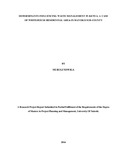| dc.contributor.author | Murugi, Ndwiga | |
| dc.date.accessioned | 2016-11-15T05:14:10Z | |
| dc.date.available | 2016-11-15T05:14:10Z | |
| dc.date.issued | 2016 | |
| dc.identifier.uri | http://hdl.handle.net/11295/97174 | |
| dc.description.abstract | Population in urban centres in Kenya has been on an upward trend and this has come with poor handling of waste in most of the cities. This study proposed to study determinants of waste management in Kenya; A case of Whitehouse residential area in Mavoko sub-county. It had four objectives: To determine the effect of household income on waste management at Whitehouse residential area in Mavoko sub-county, to determine how houses location influence waste management at Whitehouse residential area in Mavoko sub-county, to determine the effect of infrastructure on waste management at Whitehouse residential area in Mavoko sub-county and how types of waste influence waste management at Whitehouse residential area in Mavoko sub-county. The research design that was used in this research was descriptive research design. The target population of this study was the 104 residents of Whitehouse residential area in Mavoko sub-county. This number was as per the Syokimau Residents Association (SRA). The data collection instruments for the research were use of questionnaires. The study determined the validity through a careful definition of the topic of concern, the themes and the scales to be used, ensuring that the instruments contained a representative sample of the population on the subject matter of interest. The researcher employed the test-retest method to establish reliability. The researcher used both qualitative and quantitative methods to analyze data. The quantitative method to be employed was use of tables and percentages. The data was analyzed using descriptive and inferential statistics techniques. A relationship between them was established. The researcher used Statistical Packages for Social Science (SPSS). The findings of this research are that household income, location and infrastructure determined waste management in Whitehouse residential area. The findings of this research indicated that household income level affected waste management. This was supported by the fact that households with more cash support proper disposal of waste. The research found out that location of households influences the efficiency of waste management due to well-developed roads. The research found out that a significant relationship existed between the infrastructures designed for managing waste as adequate attention was not put to the existing infrastructures. | en_US |
| dc.language.iso | en | en_US |
| dc.publisher | University of Nairobi | en_US |
| dc.rights | Attribution-NonCommercial-NoDerivs 3.0 United States | * |
| dc.rights.uri | http://creativecommons.org/licenses/by-nc-nd/3.0/us/ | * |
| dc.subject | Determinants Influencing Waste Management in Kenya: a Case of Whitehouse Residential Area in Mavoko Sub-county | en_US |
| dc.title | Determinants Influencing Waste Management in Kenya: a Case of Whitehouse Residential Area in Mavoko Sub-county | en_US |
| dc.type | Thesis | en_US |



